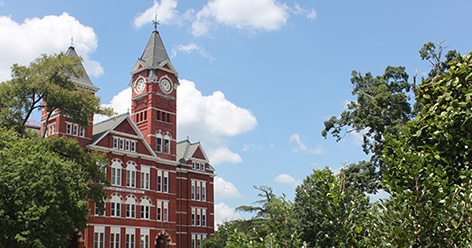CONTRIBUTED BY AUBURN UNIVERSITY
AUBURN —
Auburn University is one of three universities sharing a $28 million grant award from the U.S. Department of Agriculture’s National Institute of Food and Agriculture, or NIFA, to establish an Institute for Rural Partnership to research the causes and conditions of challenges facing rural areas.
Auburn University’s project is an interdisciplinary effort involving the College of Agriculture, the Samuel Ginn College of Engineering and the McCrary Institute for Cyber and Critical Infrastructure Security.
“This project will allow researchers from agriculture to leverage the manufacturing and cybersecurity expertise in engineering to advance some of Alabama’s most important agricultural and natural resources sectors,” said Paul Patterson, dean of Auburn’s College of Agriculture and director of the Alabama Agricultural Experiment Station.
“This is a great opportunity for the two founding colleges at Auburn University to deepen their collaborative work to advance Alabama’s economy. In addition, faculty members in Agricultural Economics and Rural Sociology will be investigating alternative enterprises that offer potential for additional growth for the agricultural sector and rural Alabama.”
Auburn’s share of the grant — $9.3 million — is for a four-year period. Others receiving funding include the University of Vermont and the University of Wisconsin.
“As part of the land-grant mission to improve the lives of the people of our state, this institute is the perfect intersection of what both our colleges do best,” said Steve Taylor, interim dean of the Samuel Ginn College of Engineering, who previously served as associate dean for research for the college and as head of the Department of Biosystems Engineering. “It’s only fitting on this 150th anniversary of our two colleges at Auburn that we boldly move forward, together, through this partnership.”
The goal of Auburn’s project is to leverage modern technologies to advance rural Alabama through poultry production and forest products, said Oladiran Fasina, department head and alumni professor for the College of Agriculture’s Department of Biosystems Engineering. Fasina also is a co-lead principal investigator for the project along with Greg Harris, professor and chair of engineering’s Department of Industrial and Systems Engineering.
Other principal investigators include Bill Dozier, professor and head, Department of Poultry Science; Mykel Taylor, associate professor and ALFA Eminent Scholar, Department of Agricultural Economics and Rural Sociology; Gregory Prudy, assistant professor, Department of Industrial and Systems Engineering; and Marc Sachs, McCrary Institute.
Alabama, Fasina said, is a global leader in the poultry and forest products agricultural industry sectors, with a $43 billion contribution from both industries to Alabama’s economy. Also, a significant percentage of the 210,000 jobs created in the state by these two industries are in rural Alabama.
“Our interdisciplinary approach will develop technology solutions that will assist producers and processors of poultry and forest products to improve their competitiveness and sustainability while addressing cyber-physical vulnerabilities due to use/adoption of modern technologies,” Fasina said.
The project also aims to reduce the pollution of bodies of water in rural Alabama by developing systems that manage and upcycle waste streams from agricultural processing facilities.
“Ultimately, we will develop case studies that showcase new technologies and opportunities for agricultural and forest production in the rural South,” Fasina said. “We will develop and deliver project findings that summarize and evaluate project impacts on rural Alabama to target stakeholders and the public.”
The distribution of funding for the project will be 85% research, 10% Extension and 5% education.


